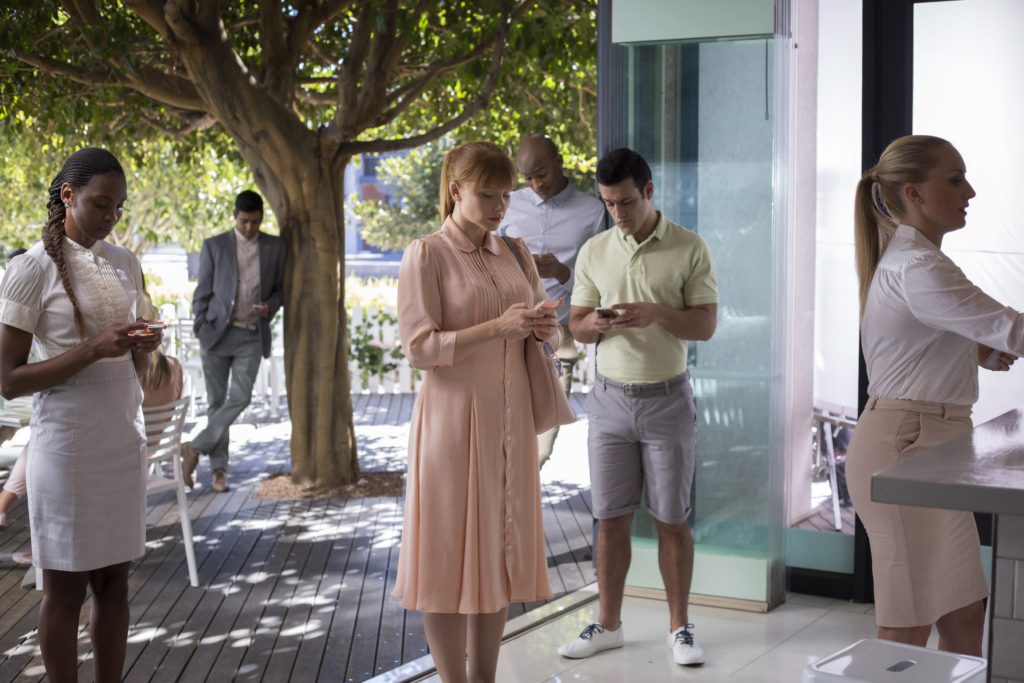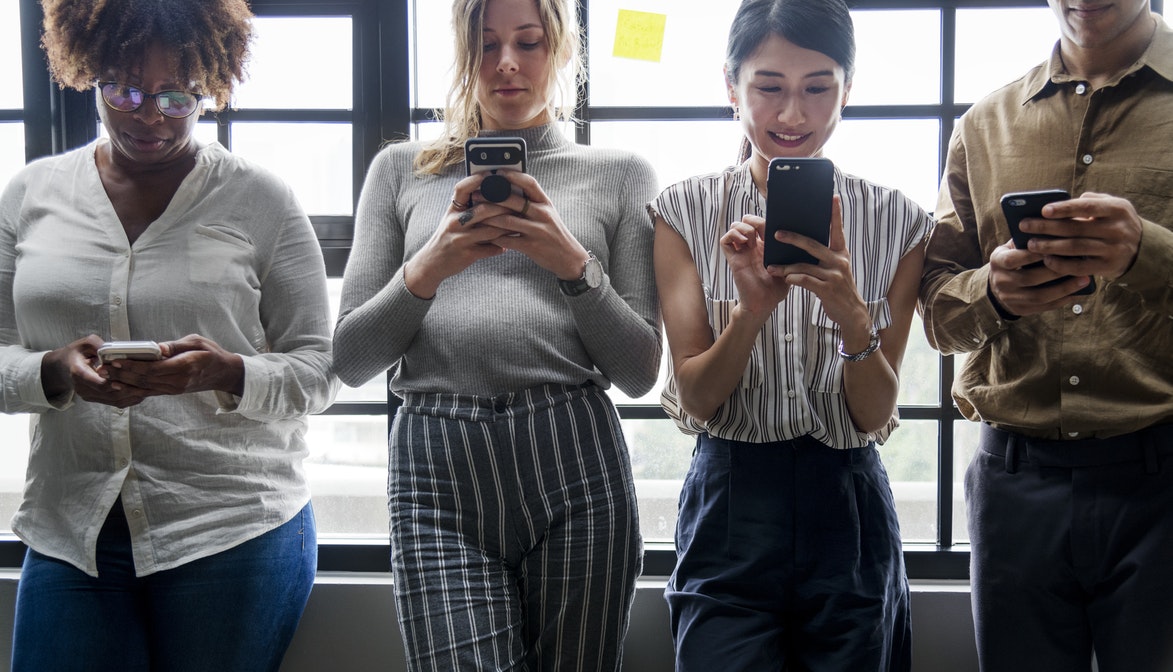Why We All Need to Get Off Our Damn Phones

For some reason, I thought things would be different in Hawaii.
I assumed one of the reasons people went to Hawaii was to retreat from the busyness of their lives, including their cell phones. I was wrong.
My wife and I just spent a week in Kauai, and everywhere I looked, I saw vacationers on their phones. Our first day at the resort, I noticed that half the people at the pool were on their phones. (Pictured above.)
Apparently even the most picturesque places in the world aren’t beautiful enough to pull us away from the alluring glow of our phones.
We are addicts.
We are addicted to the pleasurable little dopamine hits we receive when we get “likes” on our Instagram photos, new emails in our inbox, and retweets on Twitter. We are hopelessly addicted to the empty rushes of approval offered by our phones.
I’m addicted too.
I feel dopamine’s omnipresent tug. If you’re like me, you need a couple days at the start of every vacation to begin to truly unplug and relax — to stop compulsively checking email, stop expecting phone calls and texts, and stop pointlessly clicking app icons to clear the little number of new messages.
It’s embarrassing how addicted we are. Many of us will admit to being too connected to our cell phones, yet we fail to do anything about it. Either we fail to grasp how bad the problem is, or we don’t know how to fix it.
There are three reasons you and I need to stop using our phones so much:
(1) So we can prioritize real relationships
“You can make more friends in two months by becoming interested in other people than you can in two years by trying to get other people interested in you.” -Dale Carnegie
Recently I was on a walk in my neighborhood, and I strolled past a local restaurant. I love people-watching as much as the next person, so naturally I looked through the window as I walked past and formed snap judgments of the people I saw through the glass. That night, the restaurant patrons made those snap judgments pretty easy.
Two girls were seated at a table across from each other. Both were on their phones, making zero eye contact.
At another table sat a young man and woman in their twenties. The man was on his phone — completely disengaged. As he scrolled away on his device, the woman looked expectantly at him, hoping he’d find her interesting enough to engage in conversation.
Two tables, one shared story: disengagement.
I wondered what was going on at each table. What was the story for each of these couples? Friends going out for a nice meal to swap stories? Siblings grabbing a bite to eat to catch up on life? Lovers on their first date? 100th date?
In which of those situations would this level of disengagement be acceptable?
Is it ever okay?
For whatever godforsaken reason, we often prioritize our phone friends over the flesh-and-blood people seated next to us. I’ve noticed this happens a lot, and I think it’s strange.
For the life of me, I can’t figure out why it’s remotely acceptable to prioritize a text message, email, or Facebook update from a friend across the country over the people who have made the time to be physically present with us.
I think it’s time for us to recommit to personal connection — to be fully present with the people who have prioritized spending time with us.
(2) So we can wean ourselves off social approval
“If a person gave away your body to some passerby, you’d be furious. Yet you hand over your mind to anyone who comes along, so they may abuse you, leaving it disturbed and troubled — have you no shame in that?” -Epictetus
If you haven’t watched the Black Mirror episode “Nosedive” yet, you should. Charlie Brooker and the Black Mirror crew are experts in turning up the dial on reality to expose how ridiculous our world really is.
In this particular episode, Bryce Dallas Howard plays a young woman who is desperate to improve her social standing in a world where every interaction is scored on a one to five scale. Individuals with overall ratings above arbitrary levels like 4.3 or 4.5 are given perks such as lower rent, shorter waits at ticket counters, and premium placement on cancer treatment lists.
The purpose of the episode is to show how close we already are to creating this type of world. Every time we upload something online and wait to see our friends’ reactions (or even the reactions of strangers), we are chasing the mirage of social approval offered by our online communities.
I’m doing it right here, right now. (Btw, please "like" this post. I need your social approval.)
But seriously, we need to wean ourselves off crap like that.
If you want to post something because you think it will benefit others, do it.
If you want to post something because you have something to say, do it.
However, if you want to post something because you need extrinsic approval, pause and ask yourself whether it’s really worth it.

(3) So we can start paying attention to what’s really important
“A wealth of information creates a poverty of attention.” -Herbert Simon
I was frustrated watching people on their phones in Hawaii because I knew how much they were missing by looking at their narrow little screens. A beautiful world surrounded them, but they were missing it.
In some way, I think we miss out on the real world everyday. We have stopped paying attention to the beauty of nature. We no longer embrace the serendipity of interactions with strangers. We fail to cultivate boredom and the creativity that sometimes comes with it.
What is the first thing you do when you’re in line at a Starbucks, waiting at the DMV, or waiting for your neighborhood bus to arrive?
I’ll tell you what I do. I pull out my phone.
Striving to wring every ounce of “productivity” out of my day, I yank out my phone and either comb through emails, check my social media accounts, or read an article on Medium. I do this because I would hate to miss out on a minute of potential productivity.
However, what do we miss by retreating to our phones in those instances? In economic terms, what’s the “opportunity cost”?
Sometimes the cost is a few needed moments of relaxation (slowing down, breathing, meditating, clearing your head, etc.).
Sometimes the cost is a potential conversation with someone — a conversation that could have brightened their day or yours.
Sometimes the cost is missing out on a moment of shared humanity: a baby’s laugh, a person returning a stranger’s lost purse, a dog licking the top of someone’s ice cream cone. Moments like these help us appreciate the world around us.
In his book Deep Work, Cal Newport talks about another opportunity cost of retreating to our phones. He says that by constantly entertaining ourselves, we gradually lose the ability to focus. We forget how to dive deep because we’re constantly diving shallow. To maintain our long-term ability to focus, Newport encourages readers to cultivate boredom.
“If every moment of potential boredom in your life — say, having to wait five minutes in line or sit alone in a restaurant until a friend arrives — is relieved with a quick glance at your smartphone, then your brain has likely been rewired to a point where…it’s not ready for deep work — even if you regularly schedule time to practice this concentration.” -Cal Newport
By reclaiming these spare moments for ourselves rather than sacrificing them to our phones, we exercise the mental muscles needed to focus on what’s truly important. By cultivating boredom, we cultivate concentration and creativity.
How Can We Address Our Phone Problem?
I’ve begun to formulate a few personal commitments for how I want to interact with my phone. These commitments may not work for you, but they’ve been working for me:
- No aimless scrolling — Inc. magazine recently reported that the average person spends over four hours per day on their phone. That’s more than an entire day every week! Unreal. After hearing stats like that, I decided I wouldn’t be an “average person.” I put a stop to my habitual scrolling on Facebook and Twitter, which had become a daily ritual at points of low energy, like when I arrived home from work each day. I’ve begun to substitute other relaxing activities instead, like reading and going on walks.
- No double-dipping — I have a tendency to use my phone while watching tv shows or movies. While my wife and I don’t watch a ton of tv (usually one or two shows each night), we have a handful of shows we enjoy watching together. By using my phone, I was making an already impersonal activity even less personal by double-dipping with electronic stimulation. I was taking an already mindless activity (tv) and making it even more mindless (tv + phone). So, I decided to stop double-dipping and just enjoy whatever I’m watching on tv.
- No phones over dinner — This one is pretty straightforward. For centuries, humans have used meals as a time for connection. I don’t want to waste that personal connection by using my phone.
I have several friends who have employed their own phone strategies. My brother Trevor puts his phone in airplane mode whenever he’s not actively using it. My friend Thad deleted all of the social media apps on his phone. My buddy Eric encourages everyone in our friend group to put away their phones whenever we share a meal together.
There are a million strategies out there that could work for you.
What are you going to do today to get off your damn phone?




